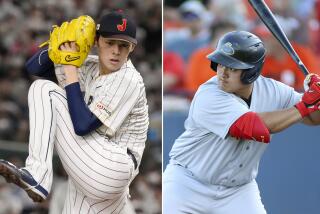GREAT EXPECTATIONS : In Chicago, They’re Counting on No. 1 Choice Ventura to Pull Up White Sox
- Share via
At venerable Comiskey Park, the talk has returned--dare we say--to 1919 and the Chicago Black Sox.
Since the release this year of “Eight Men Out,” a film chronicling White Sox players who were charged with conspiring with gamblers to lose the 1919 World Series, Chicago’s misfortunes have been recounted.
And dredging up those kinds of memories does little for the already dented White Sox psyche. The 1988 White Sox finished 71-90, fifth in the American League West, and 32 1/2 games out of first place.
In time, Robin Ventura, Chicago’s No. 1 draft choice who signed last week, hopes to lessen the blow.
When he walked inside Comiskey Park Thursday, the memories of baseball past reverberated from the walls. They were not the tales of Shoeless Joe Jackson and the scandal-ridden Black Sox, either.
“When I looked at the field I was overcome by the nostalgia of it,” Ventura said from Chicago. “All the people and teams who have played here. It’s a special feeling.”
There is a special feeling about Chicago’s future, one that is expected to be guided by the likes of Ventura and other young players such as former Stanford pitching ace Jack McDowell.
This is a team in transition, having recently fired Manager Jim Fregosi, who was counting on veterans to give Chicago a winner.
Chicago has yet to replace Fregosi, but that has done little to dampen the enthusiasm over a player of Ventura’s qualifications.
Ventura, who played at Santa Maria’s Righetti High School, is regarded as the Great White Sox hope. “It’s just showing we’re on our way,” said Steve Noworyta, Chicago’s assistant director of scouting and player development in Sarasota, Fla.
Ventura, who throws right-handed but bats left, is more than a big hitter. He plays third base, a position that has been a problem in Chicago. Last season, the White Sox experimented with Kenny Williams and Steve Lyons, outfielders who tried to adjust.
“It just didn’t work out,” Noworyta said.
Ventura thinks he fills the bill. If his past is any indication, it shouldn’t be long before he will call third base home.
Ventura, 21, played on the 1988 gold-medal winning U.S. Olympic baseball team, batting .409. Before that, he had an illustrious career at Oklahoma State.
In 1987, he set a National Collegiate Athletic Assn. record with a 58-game hitting streak. He hit .428 in 3 seasons at Oklahoma State, where he was a 3-time All-American.
The accolades kept coming this week when he won the Golden Spikes Award, an honor given to the country’s best amateur player by the U.S. Baseball Federation.
After receiving the award in New York Tuesday, Ventura was introduced to another hitter with a long streak--Joe DiMaggio, who in 1941 set a major league record by hitting in 56 consecutive games.
“There’s a big difference between college and the major leagues,” Ventura said. “There’s no way I can compare what I did to (DiMaggio’s) streak.”
But DiMaggio said, “If you’re going to do this, don’t do it next year. I want my streak to last 50 years.”
DiMaggio may have it right. Though Ventura is cautious about his prospects, he could make the majors in his first season.
“It’s a great opportunity,” Ventura said of playing for the White Sox organization. “People might expect too much too soon. If it doesn’t happen, then I didn’t deserve it.”
Perhaps it is Ventura who has the great expectations, though. From the time he was a child, he tried to keep up with his older brothers, Randy and Rick, said his mother, Darlene.
“He had to be out there playing,” she said. “I just told the boys, ‘Just let him play.’ They’d say, ‘He can’t do this or that.’ Well, he started to get a lot better. He never feared playing over his head.”
But Darlene Ventura best remembers her son’s intense interest even before he starting whaling away with plastic bats.
Robin would coming running from anywhere in the house to watch the television set when he would hear the national anthem at the start of a televised ballgame.
“He would stay through the anthem, then leave,” his mother said.
Ventura had the chance to hear that song at Seoul, after the United States had defeated Japan for the gold medal.
“Winning the gold medal, the whole scene, is something I’ll never forget,” he said. “I hope I will do something down the road that will make me almost as happy.”
Ventura, 6 feet 1 inch and 188 pounds, was a basketball and baseball star in Santa Maria but decided baseball would be the best route to a professional career.
Still, there was some doubt after his senior season, when he didn’t receive much attention from professional or college recruiters.
“We’re in between San Francisco and Los Angeles, and he may have been overlooked a little bit,” said Doak Moore, Ventura’s high school coach. “People didn’t take the time to look into it. It’s not that they didn’t want him.”
Said Darlene: “They’re just not that impressed with kids from this area.”
Though Cal, Fresno State, Stanford, UC Santa Barbara and UCLA showed interest, he chose Oklahoma State because he liked the fan support in Stillwater, where as many as 4,000 attend baseball games. “It was like a steal,” said Randy Whisler, Oklahoma State’s assistant coach. “Everything about him was great. You could tell he was a very mature individual. Even during his hitting streak he didn’t let it get to his head. He remained poised.”
His maturity will be challenged, now that he is a professional. The crowds at Comiskey, the country’s oldest ballpark, have seen it all from the great Yankee teams of the ‘20s to the great Yankee teams of the ‘60s.
Much of the White Sox history, however, has not been worthy of celebration. And they would like to change that.
Robin Ventura is listening.
More to Read
Go beyond the scoreboard
Get the latest on L.A.'s teams in the daily Sports Report newsletter.
You may occasionally receive promotional content from the Los Angeles Times.










